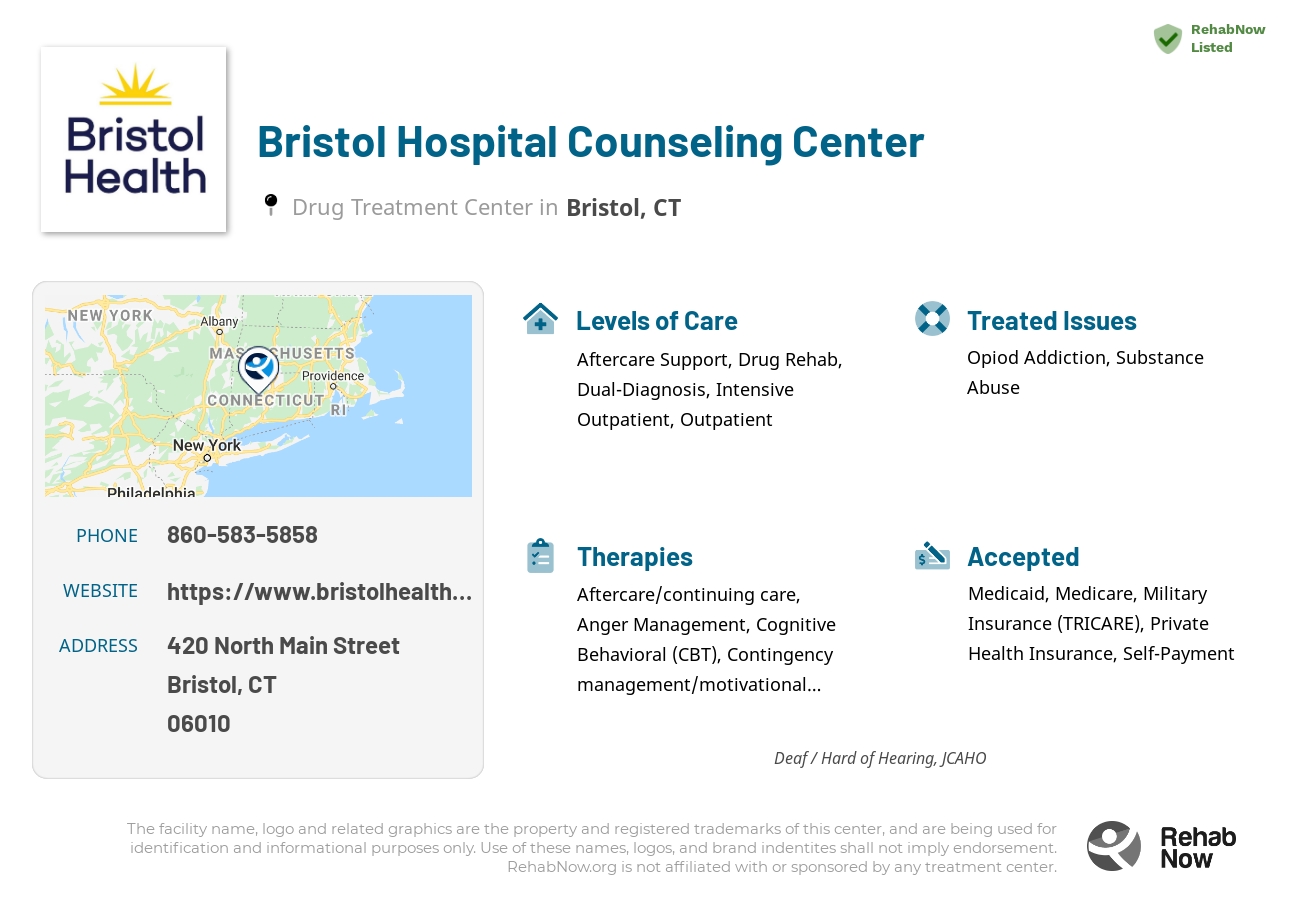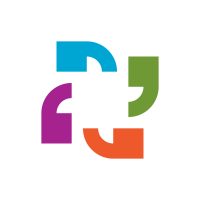Bristol Hospital Counseling Center
Drug Rehab Center in Bristol, Connecticut
The Bristol Hospital Counseling Center provides high-quality, evidence-based treatment for addiction, mental health, and co-occurring disorders through a comprehensive scope of services tailored to each individual's needs, including wrap-around services and aftercare support.
About Bristol Hospital Counseling Center in Connecticut
The Bristol Hospital Counseling Center is an outpatient treatment facility located in Bristol, Connecticut. Their mission is to provide high-quality, evidence-based treatment to those suffering from addiction, mental health, and co-occurring disorders. They provide a comprehensive scope of services that focus on each client’s individual needs, including medical and medication management, counseling, and therapeutic activities like art therapy and music therapy.
At Bristol Hospital Counseling Center, individuals and families can access a range of evidence-based evidenced-based treatment services, including individual and group therapies, as well as cognitive behavioral therapy, psychodynamic therapy, and trauma-informed treatments. Additionally, clients have access to wrap-around services, such as case management, family counseling, medical support, and relapse prevention planning. All treatment is tailored to the individual, and the facility also offers a range of aftercare services and support groups to help those in recovery maintain sobriety.
The Bristol Hospital Counseling Center is accredited by The Joint Commission and is licensed by the Connecticut Department of Mental Health and Addiction Services. The team also follows the ethical principles set forth by the American Psychological Association, and their clinical staff has a range of certifications. Additionally, their programs actively collaborate with the community and local law enforcement to ensure low-barrier access to treatment and provide continuing education opportunities for local healthcare professionals.
Genders
Ages
Modality
Additional
Accreditations
SAMHSA

JCAHO
Conditions and Issues Treated
Opioid addiction is a common form of addiction, often caused by prescription drugs that are abused. Addiction is treated by detoxifying the body and following up with therapies to correct behavior and target the root of the problem.
Most opioid addiction begins with patients being prescribed painkillers after an injury or surgery. The body becomes used to the chemicals in these medications and soon no longer responds to their presence. As a result, addicts seek out stronger opiate-based medications like Oxycodone to compensate for the lack of effectiveness.
The most dangerous aspect is that these addictive behaviors often get carried over onto illicit drugs like heroin, which are increasingly potent and result in lower life expectancies.
Dual Diagnosis treatment centers like Bristol Hospital Counseling Center provide this treatment tailored to the patient’s specific needs, and they also have a specialized focus on addiction treatment. Drug and alcohol addiction often coexists with another mental illness, such as depression or schizophrenia. In other words, drug addiction is only a symptom of a deeper problem.
When addiction enters into the picture, it can often lead to dangerous consequences in the addict’s life. For example, when addiction is paired with major depression, it can lead to suicidal thoughts or actions. When someone is addicted to drugs or alcohol, they often experience a failure to control their impulses and difficulty decision-making.
Dual diagnosis for drug addicts can be very effective when treating drug addiction in Bristol, CT.
Levels of Care Offered
This center offers a variety of custom treatment tailored to individual recovery. Currently available are Aftercare Support, Detox, Drug Rehab, Dual-Diagnosis, Intensive Outpatient, Outpatient, with additional therapies available as listed below.
Detox is the body’s process of removing toxins. In substance abuse, detox refers to the process of getting rid of drugs already present in the system once the patient stops further intake. Detox is the initial recovery step. Physiological drug dependence over time can lead to symptoms of withdrawal. Depending on the symptom severity, the detox process is managed either medically or clinically. While medically assisted detox relies on specific medicines, clinical or social detox relies on providing the patient with emotional and psychological support.
Intensive Outpatient Programs (IOPs) are a form of drug treatment that allows individuals to receive the therapy they need while remaining in their homes and community. IOPs allow for the flexibility to continue working and living at home while still meeting treatment demands.
Outpatient treatment programs are less intensive than an inpatient program. Participants live at home while working or going to school. Benefits include being able to continue relationships with family, friends, and work/studies. Treatment includes educating patient on addiction to drugs, medication, and counseling. Benefits include being able to continue relationships with family, friends, and work/studies. Treatment includes educating patient on addiction to drugs, medication, and counseling. Counseling sessions are for either individual or group.
Aftercare Support in drug rehab is crucial because it helps people stay sober after treatment. The benefits of Aftercare Support are that it provides a pathway that will help people get sober for life. It supports healing at all levels, physical, mental, emotional, and spiritual.
Therapies & Programs
Individualized Treatment is essential because it gives addicts the ability to participate in a program that meets their unique needs. An addict should work with professionals who understand what they’re going through, especially if the addict is actively using.
Trying to find a treatment program that meets your needs can be challenging. It’s even more complicated if you don’t know what kind of treatment you need. Being able to have professionals who are experienced with treating your situation is key to getting sober. Finding the right treatment program for an addict is difficult, but it’s even harder without communicating with those who have experience treating your specific situation.
Couples therapy is beneficial for couples in which at least one partner has a substance use disorder. This type of therapy can help partners improve communication skills, which is an important factor in a healthy relationship. It can also help partners better understand one another so they have a greater understanding of how the other partner may be feeling.
Benefits of couples therapy include:
- Improvement in communication skills
- Increased understanding of the dynamics within a relationship
- Increased sense of support and trust in the relationship
- Better teamwork between partners/increased willingness to listen and work together
- Enhanced tolerance of each other’s shortcomings
- Improved ability to have open, honest communication with each other
Family dysfunction can often be the underlying cause of substance abuse. To get sober, you need to find a different way to cope with the pain in your life. Family therapy can help you and your family deal with old issues that may trigger substance abuse. It will help everyone understand why each member of the family feels and acts the way they do. It can give everyone new tools to manage their emotions so that they don’t want to drink or do drugs.
A person looking for drug recovery should know that group therapy is an essential tool. Group therapy provides accountability and friendship to people with addiction. It is recommended as a lifetime treatment habit. Group therapy occurs in a group setting as opposed to a one-on-one setting. It benefits patients by providing a feeling of support and letting them know they are not alone. Patients at Bristol Hospital Counseling Center also learn to build trust and understanding and gain perspective through discussions.
If you are looking for a drug addiction treatment program that also provides trauma therapy, then Bristol Hospital Counseling Center in Bristol, CT is a great option. The staff at this facility specialize in helping people process and understand the past traumas that have led them to addiction. This approach can help individuals move forward with their recovery and take a better hold of their sober future.
The benefits of trauma therapy at Bristol Hospital Counseling Center in Bristol, CT are as follows:
- People will become less likely to engage in self destructive behaviors.
- Their emotional and mental health will significantly improve.
- They will be more confident in their abilities to live an addiction-free life.
- People will be able to connect with other people on a deeper level.
- Their problems with intimacy and trust will improve.
Dialectical behavior therapy is a type of cognitive-behavioral therapy that focuses on eliminating specific negative thoughts that can potentially lead to an individual inflicting self-harm. It helps treat patients exhibiting uncontrollable emotions, intense mood swings, and borderline personality disorders.
The term “dialectic” means the integration of opposites. In the substance abuse context, dialectical behavior therapy refers to accepting the patient’s addiction and changing their thoughts and behavior. It improves life skills such as controlling intense emotions without reacting impulsively, resolving interpersonal conflicts effectively, and promoting awareness about self and others.
Cognitive behavioral therapy (CBT) is a type of psychotherapeutic treatment that is focused on changing negative ways of thinking that contribute to addictive behavior.
Cognitive behavioral therapy is beneficial for:
- People who are seeking to overcome addictive behavior
- Those who struggle with addictive behavior and mental illness
- People who have a genetic history of addiction in their family
- Those who don’t want to depend on medications
- Those who need a more practical treatment approach
Payment Options Accepted
For specific insurance or payment methods please contact us.
Is your insurance accepted?
Ask an expert, call (888) 674-0062
Additional Details
Specifics, location, and helpful extra information.
Bristol, Connecticut 6010 Phone Number(860) 583-5858 Meta DetailsUpdated November 25, 2023
Staff Verified
Bristol Hospital Counseling Center Patient Reviews
There are no reviews yet. Be the first one to write one.
Bristol, Connecticut Addiction Information
Connecticut has a higher rate of substance abuse and addiction than the national average. The state ranks in the top 10 in the country for illicit drug dependence among those ages 18 to 25. In 2010, there were 9,211 people admitted to an alcohol treatment facility for alcohol abuse combined with a secondary drug. Connecticut ranked fifth in the United States of America for the number of fatalities involving drunk driving in 2014.
The drug addiction problem in Bristol, Connecticut, is bad. In 2013, 5.5% of Bristol residents ages 12 and older reported using illicit drugs. In 2015, there were 1,527 drug overdose deaths which is a rate of 18.8 per 100,000 residents. The drug treatment experience in Bristol, Connecticut, can vary depending on the facility. However, most drug rehab programs involve detoxification, counseling, and aftercare services.
Treatment in Nearby Cities
- Weston, CT (40.0 mi.)
- Meriden, CT (12.2 mi.)
- North Stonington, CT (57.6 mi.)
- Terryville, CT (3.3 mi.)
- Ansonia, CT (24.1 mi.)
Centers near Bristol Hospital Counseling Center
The facility name, logo and brand are the property and registered trademarks of Bristol Hospital Counseling Center, and are being used for identification and informational purposes only. Use of these names, logos and brands shall not imply endorsement. RehabNow.org is not affiliated with or sponsored by Bristol Hospital Counseling Center.









